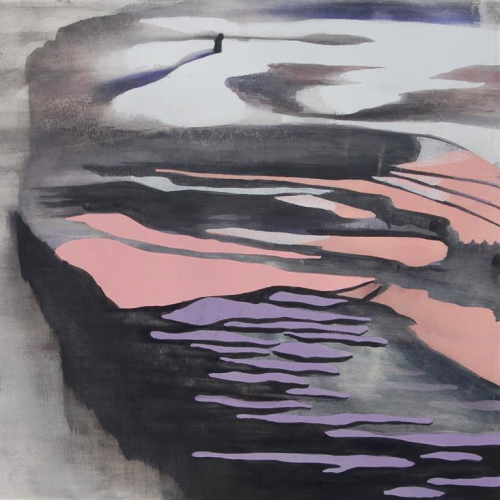TRACKLISTING:
1. The Magnet (6:07)
2. Remember Where You Were (7:43)
3. Dr. Abraham (8:11)
4. The Fox in the Hole (4:45)
6. Wasp in a Wig (6:16)
7. The White Book (9:57)
LINEUP:
Patrick McGowan – vocals, guitars, keyboards
Dan McGowan – vocals, guitars, keyboards
Jamie Wolff – bass, violin, cello
Reinhardt McGeddon – keyboards
Tony Davis – drums
Though the band originally intended to release the follow-up to 2012’s highly acclaimed Quickly, Quickly, Quickly just one year later – as, like Radiohead’s Kid A and Amnesiac, the albums were seen as two halves of a whole rather than separate items – the wait for The Tea Club’s fourth album turned out to be much longer. Now, in the last quarter of 2015, the New Jersey outfit’s latest effort has finally surfaced.
As is often the case, extensive line-up changes were involved in the delay. While the band’s mainstays, brothers Dan and Pat McGowan, are a reliable constant, the new blood brings something valuable to the equation. So, enter Joe Dorsey (aka Reinhardt McGeddon) with his array of keyboards, as well as bassist Jamie Wolff and drummer Tony Davis providing a solid yet flexible rhythmic backbone.
The aptly-titled Grappling – a fitting caption for the career of any progressive rock act in this age of disposable music – clearly reveals its close kinship with The Tea Club’s earlier effort, but, at the same time, also sheds a light on the band’s development in the course of the past three years. Though there are enough immediately recognizable elements in the sound – the explosive crescendos, driven by the McGowan brother’s vertiginous vocals, balanced by low-key, almost meditative passages – there is also the feeling of a band striving to get out of its own comfort zone.
Indeed, in some ways, Grappling is the “proggiest” album the band has ever recorded, the one that most will remind the listener of the classics, whose influence is skillfully combined with that of modern progressive rock icons such as Radiohead, Dredg and The Mars Volta. The drums – very prominent in the mix – are a true propulsive force, almost dominating the proceedings with the sheer power of their presence, while the major role of the organ evokes shades of Yes and ELP, though without any overt concessions to the “retro” craze.
If I had to summarize Grappling in just one word, I would choose “ambitious”. Right from the first notes of opener “The Magnet”, it is quite evident that The Tea Club have spared no effort in the making of their fourth album, and that their attention to detail has reached unprecedented heights. On the other hand, the album clocks in at a very restrained 42 minutes. After the experiment of the 16-minute epic “Firebears”, which opened Quickly Quickly Quickly, here the band went for a different route, packing a lot into the album’s six tracks while keeping their individual running time under 10 minutes.
With this sort of introduction, it will not come as a surprise that the individual songs are not easy to describe adequately. In fact, the music is so multifaceted and mercurial as to be occasionally hard to grasp. Opening with the bang of “The Magnet”, a catchy yet intricately woven song that introduces all the album’s distinctive elements in dramatic fashion, Grappling unfolds in a riot of sound, each song packed with unpredictable twists and turns. Things slow down at the beginning of “Remember Where You Were”, which starts out as a ballady mid-tempo before shifting into high gear, the volume surging and the vocals almost roaring, a hint of dissonance spicing the melodic texture and bringing Yes to mind. The grandiosely symphonic intro of “Dr Abraham” also evokes memories of vintage prog, though the song later unfolds in wildly unpredictable fashion, with ominous whispered vocals, atonal piano flurries and pounding drums – sounding like a 21-century version of Relayer-era Yes jamming with The Mars Volta.
Grappling’s second half is introduced by the charming “The Fox in the Hole”, a relatively understated piece with hints of Celtic folk, and plenty of opportunity for drummer Tony Davis to deploy his percussive skills. “Wasp in a Wig” initially brings to mind a traditional rock power ballad, but quickly turns into a chameleon-like display of classic Tea Club tactics, going into slo-mo, then gaining momentum again, and ending with a very engaging vocal and instrumental coda. The mellotron-drenched “The White Book” (the album’s longest track at nearly 10 minutes) closes the album on a stately, melodic note, occasionally reminiscent of Echolyn (another recognizable influence on the band’s sound), though still displaying their distinctive use of quiet-loud dynamics.
With Grappling, The Tea Club prove they have reached their full maturity as a compositional force, and are ready to assume a leading role in the overcrowded modern prog scene. The album has the potential to bridge the ever-growing gap between nostalgia-bound fans and those more rooted in the present (and the future) of the genre, and is therefore highly recommended to all lovers of progressive rock – except, of course, those for whom anything produced after 1989 is immediately disqualified.
Links:
http://www.theteaclub.net/
